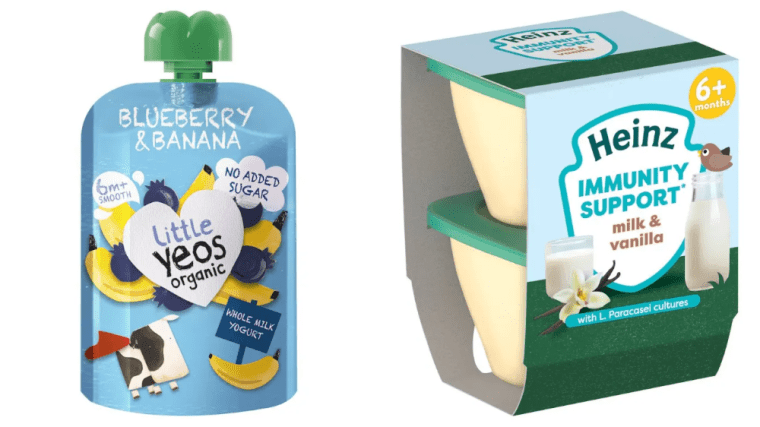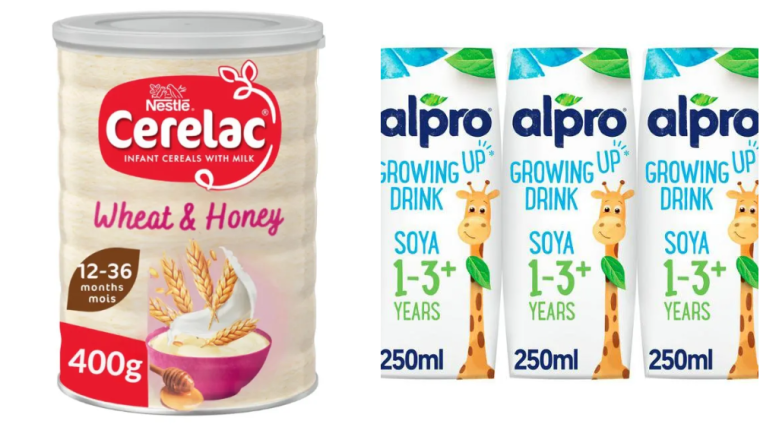The prevalence of ultra-processed ingredients in baby foods could increase as new guidelines call for reductions in the amount of salt and sugar, experts warn
Top brands such as Heinz and Kiddylicious are making baby foods that are ultra-processed, raising concerns about their impact on children’s health, The i Paper can reveal.
The prevalence of ultra-processed ingredients in baby foods could increase as the Government plans a crackdown on sugar and salt, experts warned.
Under new voluntary guidelines, manufacturers have 18 months to reduce sugar and salt in foods for children up to 36 months old, but many ultra-processed ingredients are not restricted.
New FeatureIn ShortQuick Stories. Same trusted journalism.
Alpro, Cerelac, Farley’s, Hipp, Yeo Valley and Organix are among brands whose products include ultra-processed foods, analysis by The i Paper found.
Ultra-processed foods (UPFs) are defined within the NOVA classification system, which groups foods according to the extent and purpose of industrial processing.
A practical way to identify a UPF is to check if its list of ingredients contains a food substance never or rarely used in kitchens or additives designed to make the final product more appealing, according to Carlos Monteiro, the Brazilian academic who created the framework.
These substances include natural flavours, emulsifiers, thickeners, stabilisers, maltodextrins and gelling agents, which were found in baby foods sold by major brands.
 Manufacturers have 18 months to reduce sugar and salt in foods for children up to 36 months old (Photo: Getty)
Manufacturers have 18 months to reduce sugar and salt in foods for children up to 36 months old (Photo: Getty)
The First Steps Nutrition Trust, a charity, said ultra-processed baby foods are often marketed as healthy options despite concerns about their potential health impact.
Studies have linked UPFs to health problems including obesity, cancer, type 2 diabetes, cardiovascular disease and anxiety.
Dr Vicky Sibson, director of the First Steps Nutrition Trust, said baby food regulations need to be strengthened to “address new health harms, including those associated with ingredient markers of ultra-processing”, such as certain emulsifiers and maltodextrins.
She warned some additives such as maltodextrins are linked to tooth decay, adding: “The voluntary guidelines, which are all about reducing sugar content, including free sugars, might have an unintended consequence of reducing the content of some sugars.
“The sugars may be replaced with maltodextrins, which are a concern because they are a risk to teeth.”
Maltodextrins are regarded for regulatory purposes as “added sugars” in the US, Canada, New Zealand, and Australia – but not in the UK. This means that they will not be subject to the new guidelines to cut sugar in baby foods, Dr Sibson said.
She said cutting sugar and salt could make foods less palatable, which could lead to manufacturers using more flavourings, which would be a “concern”, she added.
Obesity risks
Katharine Jenner, director of the Obesity Health Alliance, a coalition of health organisations, said the new guidelines are a step in the right direction but do not cover all health problems with baby foods.
She said: “The emerging evidence is that ultra-processed foods are associated with poor health later in life.”
Ms Jenner said ultra-processed baby foods risk priming children for a lifetime of obesity because they can get them accustomed to eating “hyper-palatable” foods, which are so tasty that they make people want to consume more than they otherwise would.
She added: “Setting taste preferences from early life is something that we can do something about, and we should be doing something about in legislation, rather than just allowing the companies that profit from selling these foods to decide what we should be giving to kids.”
 Little Yeos organic blueberry and banana yoghurt and Heinz Immunity Support baby food would be classed as ultra-processed under the NOVA classification system
Little Yeos organic blueberry and banana yoghurt and Heinz Immunity Support baby food would be classed as ultra-processed under the NOVA classification system
The Government has said it will seek additional measures if manufacturers do not implement the new voluntary guidelines within the next 18 months, but has stopped short of committing to new regulations.
Rob Percival, head of food policy at the Soil Association charity, said UPF-rich diets “deny infants the necessary exposure to the tastes, colours and textures of unprocessed and minimally processed foods, which can undermine both their acceptance of such foods and their physical ability to eat them”.
He said: “While voluntary guidelines aimed at cutting the amount of sugar and salt are welcome and necessary, as many products really are excessively sugary, Government should go further and introduce mandatory regulation, accompanied by policy measures that support increased consumption of whole and minimally processed foods from the beginning of life.”
The ingredients found
Analysis by The i Paper of hundreds of baby and toddler food products sold in the UK’s four biggest supermarkets – Asda, Sainsbury’s, Tesco and Morrison’s – found at least 55 would be classed as UPFs.
Ingredients found included emulsifiers such as lecithins and monoglycerides. These keep oil and water components from separating in packaged foods, smoothing out their consistency and extending their shelf lives.
Several studies have suggested emulsifiers may cause diseases linked to impaired intestinal barrier functions and intestinal microbiota, such as allergic diseases, coeliac disease, type 1 diabetes, Crohn’s disease and colorectal cancer, according to the First Steps Nutrition Trust.
 Nestle Cerelac infant cereals and Alpro soya drinks were also found to contain UPF ingredients
Nestle Cerelac infant cereals and Alpro soya drinks were also found to contain UPF ingredients
Sweeteners present in some foods included dextrose and caramelised sugar syrup, while thickeners such as guar gum were also used.
Maltodextrin – a carbohydrate extracted from rice, corn, wheat or potato starch – made some ingredient lists. It is used to preserve flavour, thicken up food, mimic fat content and make products last longer.
Maltodextrins have a much higher glycemic index than table sugar, meaning they can have a more significant effect on raising blood sugar levels.
Research shows they can increase acidity in the oral cavity, impacting tooth enamel and potentially contributing to the development of cavities.
Other ingredients were preservatives such as tocopherols, which help extend the shelf life of products, and natural flavourings, which are extracted from plants and animals and added to foods to enhance their taste.
Natural flavourings typically contain other ingredients – for example, several chemicals combine to create a particular flavour – but manufacturers do not have to disclose their contents.
Mark Schatzer, author of The Dorito Effect and the End of Craving, said natural flavours are used to give foods an “addictive quality” and make them taste much better than they would otherwise, which can fuel overeating.
“Flavour is nature’s language of nutrition, and what we do when we add flavours to foods is we give them the sort of superficial sheen of nutrition that they don’t actually have,” he said.
He said much more research is needed to understand the effects of ultra-processed ingredients on the human body.
“Scientists have been too focused on the macronutrients of fat and carbohydrates,” he said. “And the truth is, those really haven’t changed. What’s changed in our food system is these other things.”
What the companies said
A spokesperson for Nestlé, which also makes Cerelac, said its infant and young children products “are designed by nutrition experts and adhere to strict safety and nutritional standards”.
They said: “These products must provide specific levels of vitamins, minerals, carbohydrate, protein, fats and energy, support safe oral motor skill development and avoid potential choking hazards.
“Some of our ingredients and additives serve a practical function, such as maintaining or improving safety, digestibility, texture, taste or freshness.”
A spokesperson for Danone UK & Ireland, which makes Aptamil and Alpro products, said: “There is no universally agreed definition of UPF amongst scientists and academics, and this terminology can create unhelpful confusion for shoppers.
“So, when making decisions about food and drink, it’s important to look at the complete nutritional profile of a product. Every ingredient in our products has a purpose, is safe and supports a balanced, varied and healthy diet.”
A spokesperson for Yeo Valley said Little Yeos only uses natural organic sources “to bring the taste of real fruit purees alive”.
They said: “We believe this helps children develop healthy palates by exploring the flavours and sweetness of different fruits instead of using refined sugar only.
“Organic food production in the UK is held to the highest standards and regulated by strict legislation, ensuring it is food you can trust.”
The makers of Heinz, Farley’s, Hipp, Kiddylicious, Little Dish, Annabel Karmel and Organix products did not respond to requests for comment, and neither did Asda, Morrisons, Sainsbury’s and Tesco.
The Department of Health and Social Care said the new guidelines for manufacturers will lead to healthier food for children and labelling will be made clearer to help parents make better choices.

